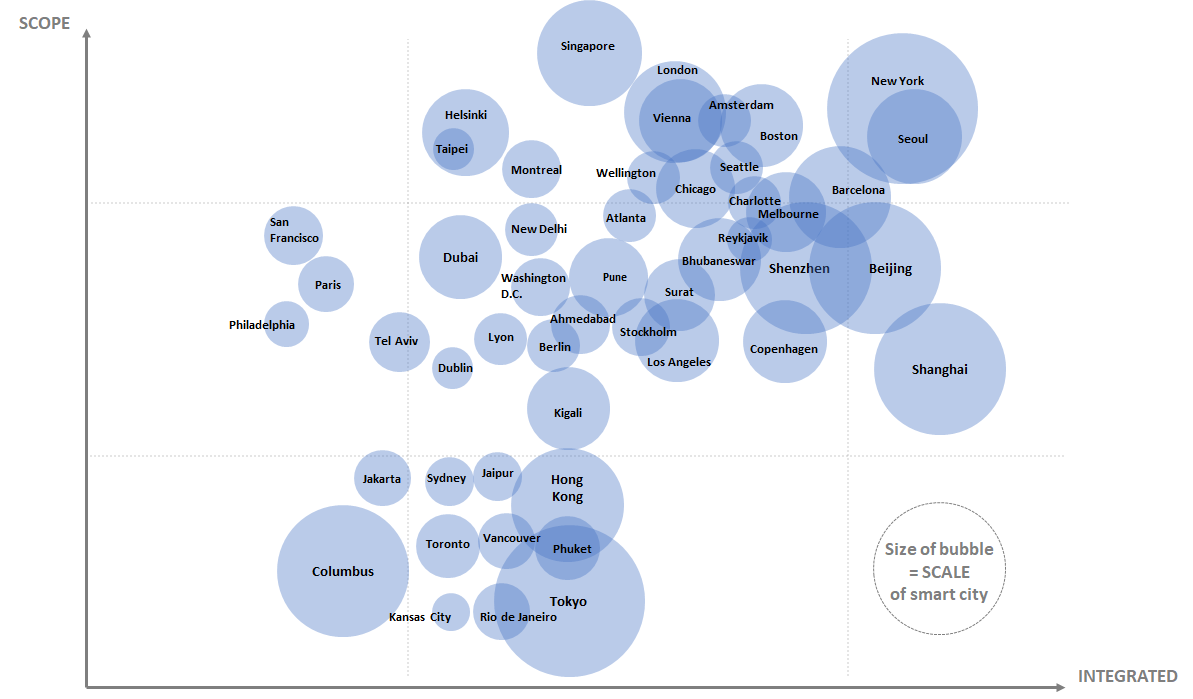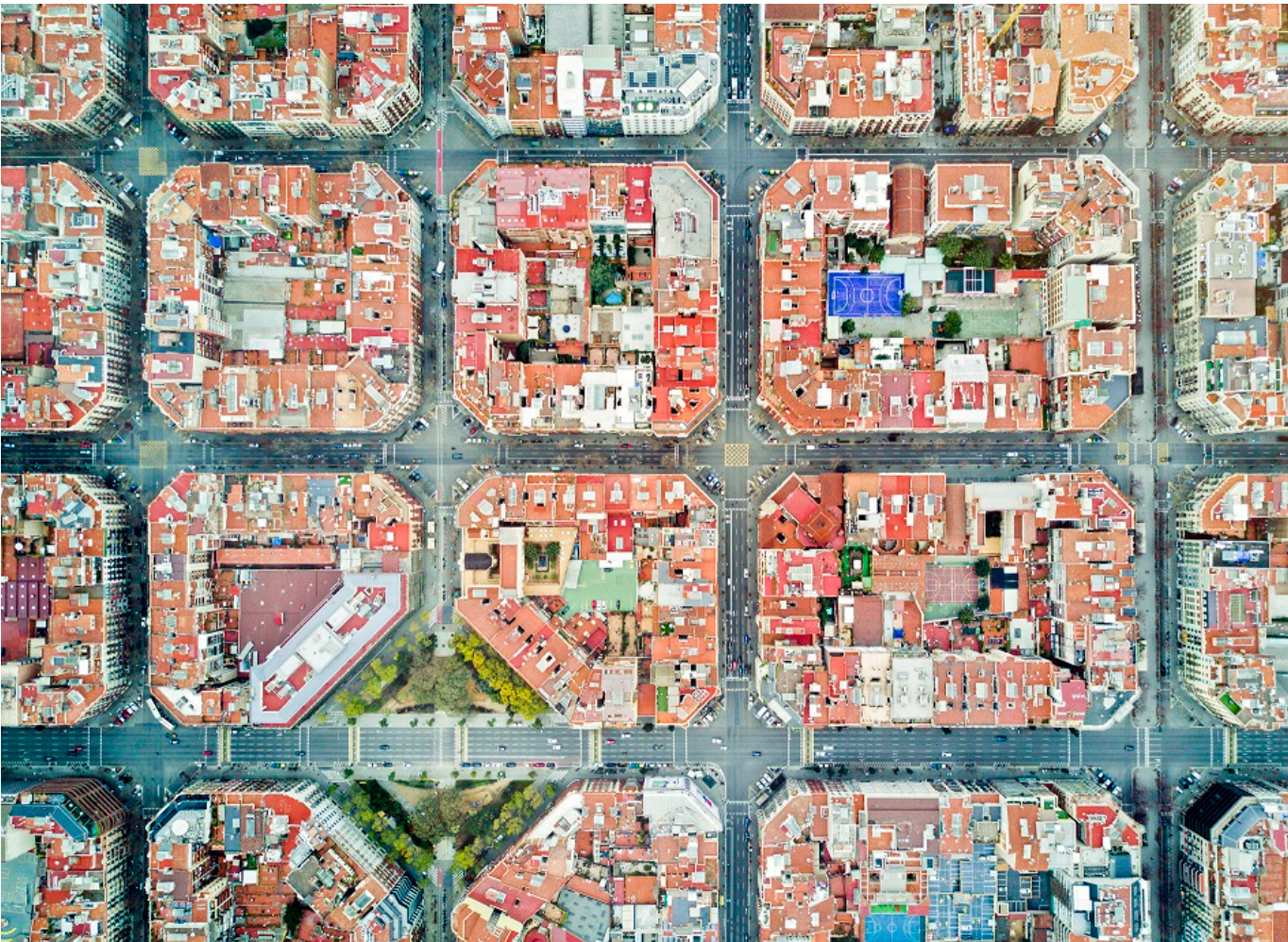Celebrating the leading Smart City Governments in the world
Smart City innovations offer mayors across the world a promising new way of engaging citizens and increasing quality of life. To offer city leaders guidance on assessing the readiness of their governments to develop, facilitate, or track their smart city initiatives, Eden Strategy Institute and ONG&ONG (OXD) developed this independent ranking of the Top 50 Smart City Governments, selected from over 140 cities globally.
2018/19 Top 50 Smart City Government Rankings
| Ranking | City | Total Score | Vision | Leadership | Budget | Financial Incentives | Support Programmes | Talent-Readiness | People Centricity | Innovation Ecosystem | Smart Policies | Track Record |
|---|---|---|---|---|---|---|---|---|---|---|---|---|
| 1 | London | 33.5 | 3.1 | 4 | 3 | 4 | 3 | 3.1 | 3 | 4.1 | 3.1 | 3.1 |
| 2 | Singapore | 32.3 | 3 | 4 | 3 | 4.1 | 3 | 3.1 | 2 | 3.1 | 4 | 3 |
| 3 | Seoul | 31.4 | 3.1 | 3 | 3 | 2.2 | 3 | 3 | 4.1 | 3 | 3 | 4 |
| 4 | New York | 31.3 | 3 | 3 | 3 | 3.1 | 3 | 3.1 | 3 | 4 | 2 | 4.1 |
| 5 | Helsinki | 31.2 | 3 | 2 | 4 | 3.1 | 3 | 4 | 3 | 3.1 | 2 | 4 |
| 6 | Montreal | 30.1 | 3.1 | 3 | 3 | 4 | 3 | 2 | 3 | 3 | 3 | 3 |
| 7 | Boston | 29.6 | 3 | 3 | 3 | 2.1 | 3 | 3.1 | 3.1 | 3.1 | 3.1 | 3.1 |
| 8 | Melbourne | 29.5 | 3 | 3 | 3 | 2.1 | 3.1 | 3.1 | 4 | 3.2 | 2 | 3 |
| 9 | Barcelona | 29.4 | 3 | 3 | 3 | 2.1 | 2 | 3.1 | 3 | 3.1 | 3.1 | 4 |
| 10 | Shanghai | 29.2 | 3 | 3 | 4 | 3.1 | 3 | 2 | 2 | 3 | 2.1 | 4 |
| 11 | San Francisco | 29.1 | 4 | 2 | 3 | 2 | 3 | 3 | 3 | 4 | 3.1 | 2 |
| 12 | Vienna | 28.5 | 4 | 3 | 3 | 2 | 3.1 | 2.1 | 3.1 | 2.1 | 2.1 | 4 |
| 13 | Amsterdam | 28.4 | 3 | 3 | 3 | 4 | 1 | 2.1 | 2.1 | 3.1 | 4 | 3.1 |
| 14 | Shenzhen | 28.3 | 3 | 3 | 4.1 | 3 | 1 | 3 | 2 | 3.1 | 3 | 3.1 |
| 15 | Stockholm | 27.7 | 4.1 | 3 | 3 | 2.1 | 2 | 2.1 | 3.1 | 3.1 | 2.1 | 3.1 |
| 16 | Taipei | 27.6 | 3.1 | 3 | 3 | 2.1 | 2.1 | 2.1 | 3 | 3.1 | 3 | 3.1 |
| 17 | Chicago | 27.4 | 3.1 | 3 | 3 | 2.1 | 1 | 3.1 | 3 | 3 | 2 | 4.1 |
| 18 | Seattle | 27.3 | 4.1 | 2 | 3 | 3 | 2.1 | 3 | 2 | 3.1 | 2 | 3 |
| 18 | Hong Kong | 27.3 | 3.1 | 3 | 3 | 4 | 2.1 | 3 | 2 | 3 | 1.1 | 3 |
| 20 | Charlotte | 27.2 | 3 | 3 | 3 | 2 | 2 | 2.1 | 3 | 3 | 3 | 3.1 |
| 21 | Vancouver | 27.1 | 3 | 3 | 3 | 2 | 2 | 3 | 3.1 | 3 | 2 | 3 |
| 21 | Washington, DC | 27.1 | 4 | 3 | 3 | 2.1 | 2 | 2 | 2 | 3 | 4 | 2 |
| 23 | New Delhi | 27.0 | 3 | 3 | 3 | 2 | 2 | 4 | 3 | 2 | 2 | 3 |
| 24 | Copenhagen | 26.6 | 3 | 3.1 | 3 | 2 | 2 | 2 | 3.2 | 3.2 | 2 | 3.1 |
| 25 | Columbus | 26.4 | 4.1 | 3 | 4 | 3.1 | 3 | 1 | 2.1 | 3.1 | 1 | 2 |
| 26 | Los Angeles | 26.3 | 3 | 3 | 3 | 2 | 2.1 | 3 | 3.1 | 3 | 2.1 | 2 |
| 27 | Surat | 26.2 | 3 | 3 | 3 | 3 | 2 | 2.1 | 3.1 | 2 | 2 | 3 |
| 28 | Tokyo | 26.0 | 4 | 3 | 3 | 2 | 2 | 1 | 2 | 3 | 3 | 3 |
| 29 | Berlin | 25.8 | 3 | 4 | 2 | 2 | 2.1 | 1 | 3.2 | 3.2 | 3.1 | 2.2 |
| 30 | Beijing | 25.5 | 3 | 3 | 3 | 3.2 | 1 | 3.1 | 2 | 3.1 | 2 | 2.1 |
| 31 | Sydney | 25.4 | 3 | 2 | 2 | 2 | 2.1 | 3 | 3.1 | 3.1 | 2.1 | 3 |
| 32 | Ahmedabad | 25.3 | 3 | 3 | 3 | 3.1 | 2 | 2.1 | 2.1 | 3 | 2 | 2 |
| 32 | Bhubaneswar | 25.3 | 3 | 3 | 3 | 2 | 2.1 | 2 | 3.1 | 2 | 2 | 3.1 |
| 34 | Jaipur | 25.2 | 3 | 3 | 3 | 2.1 | 2 | 2.1 | 3 | 3 | 2 | 2 |
| 35 | Atlanta | 25.1 | 3 | 2.1 | 3 | 3 | 3 | 2 | 1 | 3 | 2 | 3 |
| 36 | Pune | 25.0 | 3 | 3 | 3 | 2 | 2 | 2 | 4 | 2 | 2 | 2 |
| 37 | Wellington | 24.4 | 3 | 3 | 3 | 1 | 2.1 | 2 | 3 | 2.1 | 2 | 3.2 |
| 38 | Kansas City | 24.3 | 4 | 2 | 4 | 1 | 2.1 | 1 | 3 | 2.1 | 2.1 | 3 |
| 39 | Toronto | 24.2 | 2 | 3 | 3 | 2.1 | 2 | 2 | 2.1 | 3 | 2 | 3 |
| 40 | Dubai | 24.0 | 3 | 3 | 3 | 2 | 2 | 3 | 1 | 2 | 2 | 3 |
| 41 | Dublin | 23.6 | 3 | 4 | 2 | 3 | 2 | 1 | 2.1 | 2.3 | 2.1 | 2.1 |
| 42 | Tel Aviv | 23.3 | 3 | 1 | 3 | 2.1 | 2 | 2.1 | 2 | 4 | 2.1 | 2 |
| 43 | Philadelphia | 23.1 | 2 | 2 | 3 | 2 | 2 | 3 | 2 | 3 | 2.1 | 2 |
| 44 | Reykjavik | 22.8 | 2 | 3 | 2 | 2.1 | 2.1 | 1 | 4.1 | 2.3 | 2 | 2.2 |
| 45 | Lyon | 22.6 | 3 | 3 | 3 | 2.2 | 2 | 2.1 | 2 | 1 | 1 | 3.3 |
| 46 | Paris | 22.4 | 3 | 2 | 3 | 2 | 2 | 2 | 2.1 | 2.1 | 2.2 | 2 |
| 47 | Jakarta | 22.2 | 3 | 3 | 3 | 2 | 2 | 1 | 2 | 2.1 | 2 | 2.1 |
| 48 | Rio de Janeiro | 21.2 | 2 | 1 | 2 | 2 | 2 | 2.1 | 3 | 2 | 2.1 | 3 |
| 49 | Phuket | 21.1 | 3 | 2 | 3 | 2.1 | 2 | 2 | 1 | 2 | 2 | 2 |
| 50 | Kigali | 20.0 | 2 | 1 | 2 | 2 | 2 | 3 | 2 | 3 | 1 | 2 |
Key Insights
In the course of our study, we have identified 10 Themed Observations for governments to consider when planning a Smart City.
Read our full report that details these insights, by clicking the button at the top of this page.
1. Funding Smart City Initiatives
Innovative smart city funding mechanisms include competitions and hackathons, partnerships with private companies, smart procurement policies, and national- or state-level funds.
2. Developing a Smart City Strategy
Defining the smart solutions relevant to a city involves studying the actual interactions that citizens have with the city, leveraging the city's natural strengths, and co-creating the smart city vision and roadmap to align all constituents .
3. Smart Clusters & Innovation Districts
Cities around the world are increasingly experimenting with geographically-concentrated innovation ecosystems as innovation testbeds and hubs for knowledge exchange.
4. Digital Inclusion in Smart Cities
A city only becomes truly "smart" when all citizens are ready for it. Cities risk excluding entire segments of their population from the smart city experience. Teaching people how to navigate the digital world is a critical aspect of a digital inclusion plan.
5. The Promise of Open Data
Open data has emerged as a cost-efficient way to increase civic engagement, introduce city projects that attend to citizen needs, track the performance of smart city initiatives, improve efficiency and responsiveness, and apply knowledge from the general public to city solutions.
6. Co-creating the smart city
Involving outside businesses, startups, students, and the public at large can lead to larger variety, volume, and quality of insights, ideas, and feedback. In turn, citizens have shown great enthusiasm when they are given the opportunity to participate in designing and deciding their cities' future.
7. Smart City Leadership Models
Governments need to design flexible pathways for leadership to naturally evolve, as smart city initiatives increase in complexity or range, as the focus of initiatives broaden, or as the numbers of constituents grow in the city.
8. Sharing Knowledge Across Cities
City leaders can gain access to extensive knowledge networks and do not have to accomplish their smart city mission in isolation.
9. Preparing a Smart Workforce
Leading smart cities recognize the importance of supporting their citizens of all ages with digital skills. Learning experiences include hackathons to help communities familiarize themselves with digital tools, formal educational programmes, and industry immersion to help create the workforce of the future.
10. Beyond Affordability and Efficiency
A truly smart city has the potential to transform the character and liveablity of a city, rejuvenate its economy and heritage, enhance its resilience and sustainability, and even tighten the social compact with the government and among citizens.
-(1)_format-1500w.png)












